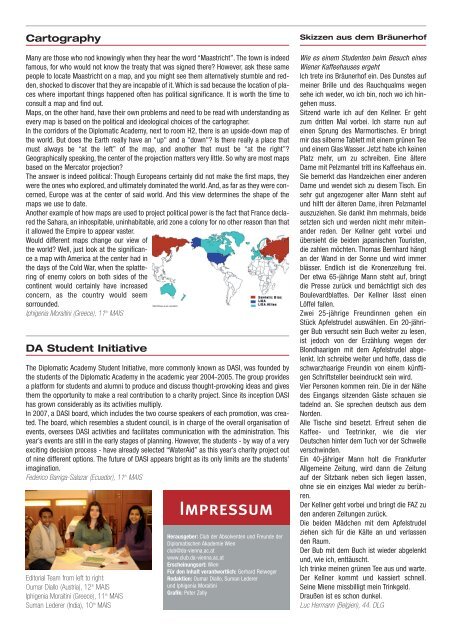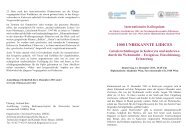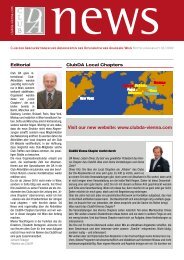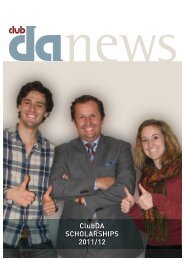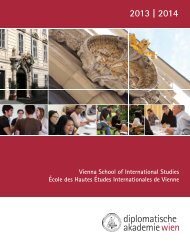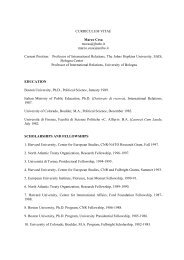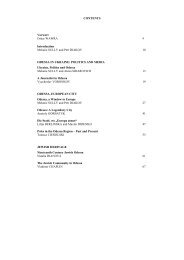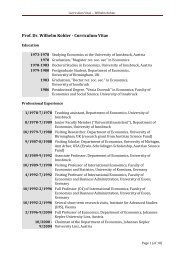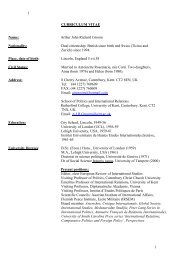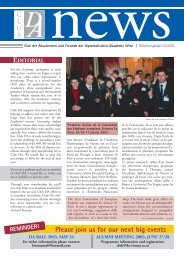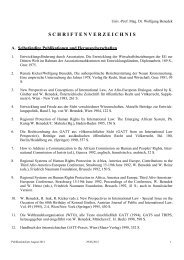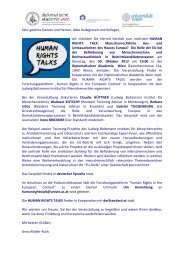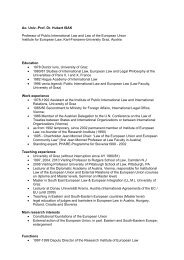DA News 2/2007 - Diplomatic Academy Vienna
DA News 2/2007 - Diplomatic Academy Vienna
DA News 2/2007 - Diplomatic Academy Vienna
You also want an ePaper? Increase the reach of your titles
YUMPU automatically turns print PDFs into web optimized ePapers that Google loves.
Cartography<br />
Many are those who nod knowingly when they hear the word “Maastricht”. The town is indeed<br />
famous, for who would not know the treaty that was signed there? However, ask these same<br />
people to locate Maastricht on a map, and you might see them alternatively stumble and redden,<br />
shocked to discover that they are incapable of it. Which is sad because the location of places<br />
where important things happened often has political significance. It is worth the time to<br />
consult a map and find out.<br />
Maps, on the other hand, have their own problems and need to be read with understanding as<br />
every map is based on the political and ideological choices of the cartographer.<br />
In the corridors of the <strong>Diplomatic</strong> <strong>Academy</strong>, next to room H2, there is an upside-down map of<br />
the world. But does the Earth really have an "up" and a "down"? Is there really a place that<br />
must always be “at the left” of the map, and another that must be “at the right”?<br />
Geographically speaking, the center of the projection matters very little. So why are most maps<br />
based on the Mercator projection?<br />
The answer is indeed political: Though Europeans certainly did not make the first maps, they<br />
were the ones who explored, and ultimately dominated the world. And, as far as they were concerned,<br />
Europe was at the center of said world. And this view determines the shape of the<br />
maps we use to date.<br />
Another example of how maps are used to project political power is the fact that France declared<br />
the Sahara, an inhospitable, uninhabitable, arid zone a colony for no other reason than that<br />
it allowed the Empire to appear vaster.<br />
Would different maps change our view of<br />
the world? Well, just look at the significance<br />
a map with America at the center had in<br />
the days of the Cold War, when the splattering<br />
of enemy colors on both sides of the<br />
continent would certainly have increased<br />
concern, as the country would seem<br />
sorrounded.<br />
Iphigenia Moraitini (Greece), 11 th MAIS<br />
<strong>DA</strong> Student Initiative<br />
The <strong>Diplomatic</strong> <strong>Academy</strong> Student Initiative, more commonly known as <strong>DA</strong>SI, was founded by<br />
the students of the <strong>Diplomatic</strong> <strong>Academy</strong> in the academic year 2004-2005. The group provides<br />
a platform for students and alumni to produce and discuss thought-provoking ideas and gives<br />
them the opportunity to make a real contribution to a charity project. Since its inception <strong>DA</strong>SI<br />
has grown considerably as its activities multiply.<br />
In <strong>2007</strong>, a <strong>DA</strong>SI board, which includes the two course speakers of each promotion, was created.<br />
The board, which resembles a student council, is in charge of the overall organisation of<br />
events, oversees <strong>DA</strong>SI activities and facilitates communication with the administration. This<br />
year’s events are still in the early stages of planning. However, the students - by way of a very<br />
exciting decision process - have already selected “WaterAid” as this year’s charity project out<br />
of nine different options. The future of <strong>DA</strong>SI appears bright as its only limits are the students’<br />
imagination.<br />
Federico Barriga-Salazar (Ecuador), 11 th MAIS<br />
Editorial Team from left to right:<br />
Oumar Diallo (Austria), 12 th MAIS<br />
Iphigenia Moraitini (Greece), 11 th MAIS<br />
Suman Lederer (India), 10 th MAIS<br />
Impressum<br />
Herausgeber: Club der Absolventen und Freunde der<br />
Diplomatischen Akademie Wien<br />
club@da-vienna.ac.at<br />
www.club.da-vienna.ac.at<br />
Erscheinungsort: Wien<br />
Für den Inhalt verantwortlich: Gerhard Reiweger<br />
Redaktion: Oumar Diallo, Suman Lederer<br />
und Iphigenia Moraitini<br />
Grafik: Peter Zolly<br />
Skizzen aus dem Bräunerhof<br />
Wie es einem Studenten beim Besuch eines<br />
Wiener Kaffeehauses ergeht<br />
Ich trete ins Bräunerhof ein. Des Dunstes auf<br />
meiner Brille und des Rauchqualms wegen<br />
sehe ich weder, wo ich bin, noch wo ich hingehen<br />
muss.<br />
Sitzend warte ich auf den Kellner. Er geht<br />
zum dritten Mal vorbei. Ich starre nun auf<br />
einen Sprung des Marmortisches. Er bringt<br />
mir das silberne Tablett mit einem grünen Tee<br />
und einem Glas Wasser. Jetzt habe ich keinen<br />
Platz mehr, um zu schreiben. Eine ältere<br />
Dame mit Pelzmantel tritt ins Kaffeehaus ein.<br />
Sie bemerkt das Handzeichen einer anderen<br />
Dame und wendet sich zu diesem Tisch. Ein<br />
sehr gut angezogener alter Mann steht auf<br />
und hilft der älteren Dame, ihren Pelzmantel<br />
auszuziehen. Sie dankt ihm mehrmals, beide<br />
setzten sich und werden nicht mehr miteinander<br />
reden. Der Kellner geht vorbei und<br />
übersieht die beiden japanischen Touristen,<br />
die zahlen möchten. Thomas Bernhard hängt<br />
an der Wand in der Sonne und wird immer<br />
blässer. Endlich ist die Kronenzeitung frei.<br />
Der etwa 65-jährige Mann steht auf, bringt<br />
die Presse zurück und bemächtigt sich des<br />
Boulevardblattes. Der Kellner lässt einen<br />
Löffel fallen.<br />
Zwei 25-jährige Freundinnen gehen ein<br />
Stück Apfelstrudel auswählen. Ein 20-jähriger<br />
Bub versucht sein Buch weiter zu lesen,<br />
ist jedoch von der Erzählung wegen der<br />
Blondhaarigen mit dem Apfelstrudel abgelenkt.<br />
Ich schreibe weiter und hoffe, dass die<br />
schwarzhaarige Freundin von einem künftigen<br />
Schriftsteller beeindruckt sein wird.<br />
Vier Personen kommen rein. Die in der Nähe<br />
des Eingangs sitzenden Gäste schauen sie<br />
tadelnd an. Sie sprechen deutsch aus dem<br />
Norden.<br />
Alle Tische sind besetzt. Erfreut sehen die<br />
Kaffee- und Teetrinker, wie die vier<br />
Deutschen hinter dem Tuch vor der Schwelle<br />
verschwinden.<br />
Ein 40-jähriger Mann holt die Frankfurter<br />
Allgemeine Zeitung, wird dann die Zeitung<br />
auf der Sitzbank neben sich liegen lassen,<br />
ohne sie ein einziges Mal wieder zu berühren.<br />
Der Kellner geht vorbei und bringt die FAZ zu<br />
den anderen Zeitungen zurück.<br />
Die beiden Mädchen mit dem Apfelstrudel<br />
ziehen sich für die Kälte an und verlassen<br />
den Raum.<br />
Der Bub mit dem Buch ist wieder abgelenkt<br />
und, wie ich, enttäuscht.<br />
Ich trinke meinen grünen Tee aus und warte.<br />
Der Kellner kommt und kassiert schnell.<br />
Seine Miene missbilligt mein Trinkgeld.<br />
Draußen ist es schon dunkel.<br />
Luc Hermann (Belgien), 44. DLG


